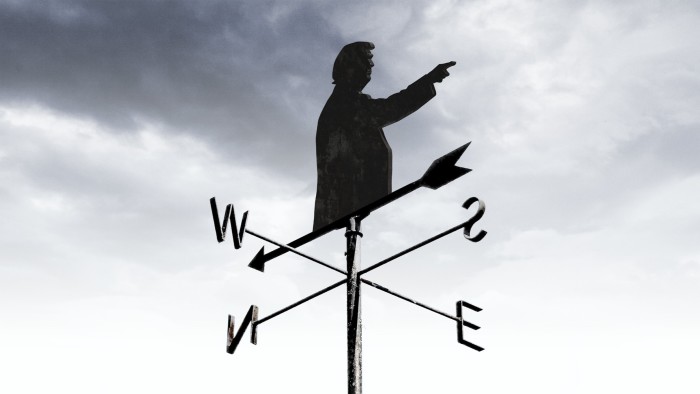Unlock the White House Watch newsletter for free
Your guide to what the 2024 US election means for Washington and the world
In Siem Reap airport, your eyes don’t know whether to settle on the handsome vaulted ceiling or what must be the world’s most polished floor. How did Cambodia, not long ago one of the UN’s least developed countries, come to build so sleek and modern an asset in its second city? The billboards in the hall leave no doubt. Chinese investment and knowhow did this.
In other news, the US is proposing 49 per cent tariffs on Cambodia. Neighbouring Vietnam gets just the 46 per cent. Singapore, though it escapes with 10, now fears for its trade-led economic model. If south-east Asia is the frontline of the US-China contest — a contest that Donald Trump chose, having cast his predecessors as soft touches for Beijing — these tariffs could drive wavering states into the Chinese orbit, and pro-US ones to start hedging. In other words, one Maga goal (the containment of China) contradicts another (“liberation day”).
Now, let me guess: there is a clever-clever reason why, actually, this all makes total sense. There always is.
At what point does the world call off the search for a grand Trump strategy? British readers will remember Baldrick, the hapless TV sidekick who always kept a “cunning plan” up his sleeve. Trump makes no such claim. Instead, he has cunning plans ascribed to him by those who find it hard to believe that dogma, caprice and nihilism are factors at the top of politics.
And so we have the too-clever-by-half theory that Trump, with his tariffs, just wants to pressure countries into a deal to manage down the value of the dollar. If this were the aim, why not target the largest economies? (The Plaza Accord in 1985 encompassed the US, UK, West Germany, France and Japan.) How much sway does Moldova, which faces a 31 per cent tariff, have in foreign exchange markets? Or Botswana? Whatever one thinks of tariffs in principle, the mathematical casualness by which these ones were arrived at should be a clue that no great chess game is unfolding here.
“Plaza theory” isn’t even the most exotic attempt to rationalise a Trump policy this year. Forced to account for his treatment of Ukraine, some suggest that a “reverse Nixon” is afoot, in which the US charms Russia out of its embrace with China. Why this would be such a strategic blow for China, which has 10 times the population of Russia, is apparently not for us to question.
A parallel theory is that stinting Ukraine frees up US resources for the “real” theatre of Asia. But if that were Trump’s aim, he would be reinforcing America’s allies in the region. Instead, no president has made it clearer that a US security guarantee isn’t to be trusted. If Europeans feel exposed, imagine being the Philippines or Japan right now, both of which have had a mutual defence pact with the US since 1951. As for Taiwan, which has no such thing, Joe Biden was (perhaps rashly) explicit in his willingness to defend the island regardless. Trump isn’t. This is a respectable choice. But how does it square with the idea that he is husbanding American wherewithal and credibility for the Pacific? It doesn’t. It isn’t meant to.
In the end, there are just too many contradictions in the Trump worldview to warrant any talk of a grand plan. For example, his movement considers the following two truths to be self-evident. China is a ruthless force that western governments have indulged for too long. But Viktor Orbán, China’s one-man bridge to Europe? Great guy. If strategy means anything, it is having a sense of the connectedness of things. There is none of that here.
Still, the world will keep trying to find shape and pattern in the chaos. For many, I suspect it is an emotional coping mechanism. In ever scarier times, it is soothing to believe that a secret plan is at work, even if it is a distasteful plan.
But there is more going on here than fear. Ultimately, liberal societies struggle to understand — or even to credit the existence of — irrational actors. When confronted with them, our reflex is to find a logic behind their behaviour, even to the point of forcibly attributing one to them. A lot of people spent a lot of time pretending that al-Qaeda was motivated by the plight of the Palestinians and other downtrodden Muslims. The 2020s equivalent of this is a tendency to discount Russia’s neo-imperial rhetoric as so much padding for what must, surely, be a set of pragmatic demands.
This blind spot for zeal, this inability to take extremists at their word, is not something the west can do much about. Base a culture on the idea of universal reason — as we should — and it becomes difficult over time to fathom other drivers of human behaviour. Business is especially hopeless at it. The very rationalism of tech and finance moguls has got them into their present pickle over Trump. It’s not that they thought he specifically was as pragmatic as them. They are liable to think everyone is.
I myself have squandered perfectly good hours and neurons on the search for a great Trump design for the world. How much of one is there? Well, he has a sincere belief that running a current account deficit constitutes “losing”. He also has a willingness to negotiate, and even to settle on bad terms for himself, for the momentary glory of a “deal”. But much more than that? A vision for a new financial and security architecture to rival Harry Truman’s, which will materialise any day now, just wait and see? The idea is laughable, and I suspect, behind his hands, Trump is doing much of the laughing.
janan.ganesh@ft.com


